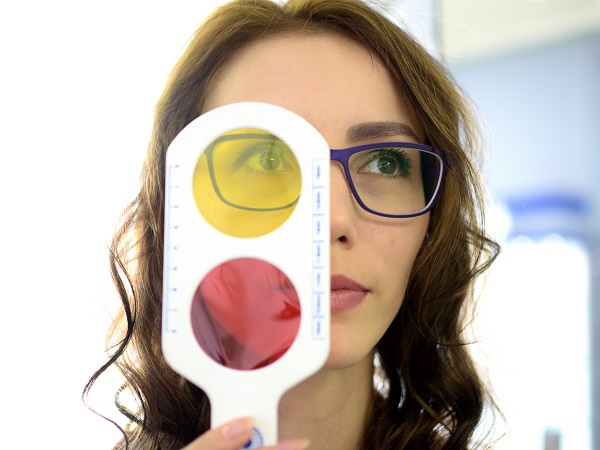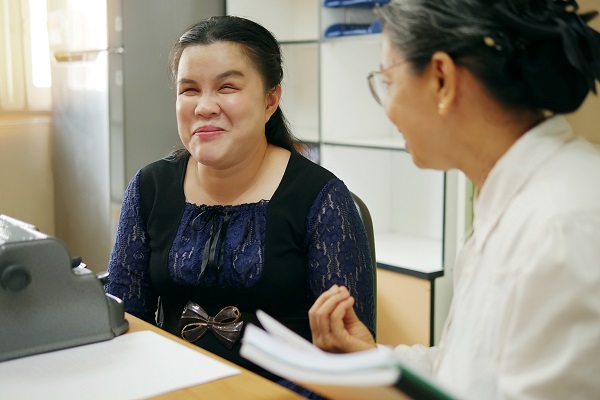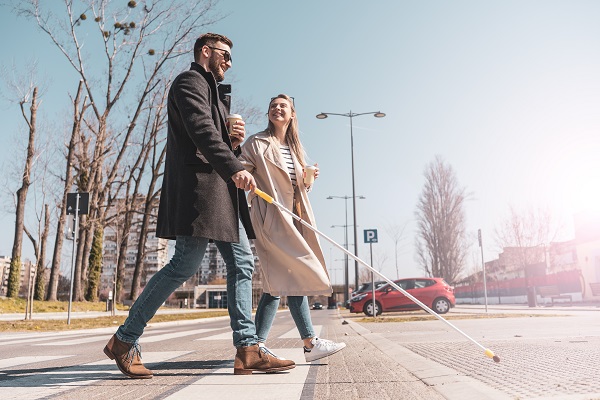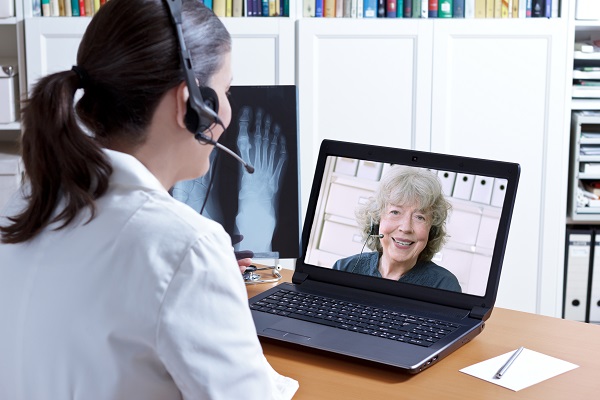Our people
Meet the individuals behind Vision Loss Rehabilitation Canada
Our staff are not only highly trained experts with exceptional skills and experience, but they also care deeply about their work and the people with vision loss they work with. Here’s what some of our team members have to say about their roles…
"I love a career where I can provide so many unique people with the tools and information they need to live independently with vision loss. Watching their confidence in their skills grow, hearing them celebrate their achievements, it’s such a joy. To be able to provide one-on-one individualized instruction is a really special kind of job."
Meghan von Holstein-Rathlou, orientation and mobility/independent living skills specialist
"Helen Keller once said that ‘the best and most beautiful things in the world cannot be seen or even touched - they must be felt with the heart.’ As an early intervention specialist, I get to live this every day. I see it when the ‘connection’ is made between the child and adult with trust, when a concept is learned, or the child is able to do things independently. My heart is always filled with optimism and belief in the children and their families."
-Sandy Summers, early intervention specialist
"It’s rewarding to see children with vision loss thrive and their families celebrating their success every step of the way. When they’re happy, then I’m happy."
-Ivy Chan, early intervention specialist/early childhood vision consultant
"My role is to support in identifying opportunities for children and their families to develop skills and maintain goals and aspirations. I’m there to empower parents and caregivers on how to engage their child in everyday activities and routines within their family."
-Jody Whelan, early intervention specialist/early childhood vision consultant
VLRC's team of professionals
Client Care Navigators

Our dedicated Client Navigators are essentially the clients' personal guide through their healthcare journey. Vision loss can be a daunting diagnosis, so each client is paired with a dedicated Client Navigator who begins by conducting a thorough intake assessment. This serves as a personalized roadmap to understand the client's unique needs and challenges. Once we have a clear picture, our Client Navigators expertly connect our clients with the right internal services within our organization, ensuring they receive the tailored care they deserve.
Recognizing that healthcare extends beyond VLRC, our Client Navigators also act as bridges to community services and resources and will seamlessly refer clients to the broader network of services available in their community.
The best part is that our Client Navigators remain a constant source of support and information throughout our clients' healthcare journey.
Back to topCertified Low Vision Therapist CLVT

Our Certified Low Vision Therapists (CLVT) use functional vision evaluation instruments to assess visual acuity, visual fields, contrast sensitivity function, colour vision, stereopsis, visual perceptual and visual motor functioning, and literacy skills. They demonstrate techniques to assist clients with environmental modifications and basic activities of daily living. In addition to assessing reading and writing requirements, they instruct clients on how to use their prescribed low-vision devices.
Our Low Vision Therapists adhere to the strict ACVREP certification protocols.
Clients who work with a CLVT can lead a more independent and fulfilling life.
Back to topCertified Vision Rehabilitation Therapist CVRT

Our Certified Vision Rehab Therapists focus on instructing clients on how to effectively use compensatory skills and assistive technology. They guide clients through the management of their activities of daily living, whether at work, school or during leisurely pursuits—empowering them with practical skills for various life domains. In addition, our CVRT's teach clients how to use adaptive communications, including large-print, braille and audio products. By imparting these essential skills, they enhance our clients' vocational, educational and independent living skills.
Back to topCertified Orientation and Mobility Specialist COMS

Our Certified Orientation & Mobility Specialists help clients to navigate their environments safely and confidently - whether it's in the home, school, workplace or taking public transit. Our specialists use a sequential process to train clients to utilize their remaining senses to determine their position in the environment. For instance, they teach skills such as sighted guides, using a white cane, crossing intersections, riding public transit, and getting around in the community. Clients who work with an O&M specialist are able to lead a more independent and fulfilling life.
Depending on their client needs, our O&M specialists focus on:
- Spatial concept development, which involves body awareness, and relative positions in reference to compass directions
- Sensory development (auditory, tactile etc.)
- Motor development (balance, posture & gait)
- Localization in space
- Self-protective techniques
- Identifying & analyzing intersections
- White cane techniques
Assistive Technology Specialist ATS

Our Assistive Technology (AT) Specialists evaluate, recommend, and train clients on assistive technologies so they can function at school, work and home. AT specialists assess current hardware and software and assist clients to optimize the use of their remaining vision or use non-visual techniques such as auditory and tactual. They set up and configure the hardware or software, train the client on usage and troubleshoot any issues. In addition, they also help eligible clients secure funding for the purchase of assistive products. Clients who work with an AT specialist are able to lead a more independent and fulfilling life.
Back to topOccupational therapist OT

Our Occupational Therapists work with clients to maximize their existing skills and can offer them easier alternative ways to do things. They work in hospital and community settings to coordinate services for visually impaired clients with multiple complex health issues. Our dedicated OTs are key players in clients' discharge planning and home safety evaluations. The OTs customize their rehabilitation approaches, so they are unique to each client's individual abilities, needs, interests and life preferences. Some techniques include education on safety during daily activities and setting up modifications of home environments, as well as evaluation and training on the use of low vision devices or aids — magnifiers, lighting and electronic magnification, voiceover and other technological devices.
Back to topCounsellors (Social Worker, Psychologist)

Vision loss is a significant life event that brings with it a range of emotions such as loneliness, helplessness, anxiety and depression. At VLRC, we want to be there for our clients during these tough times. That's why we are expanding our service to provide therapeutic counselling. Our team of registered psychologists and social workers are compassionate and empathetic. They have a deep understanding of how vision loss can be devastating and will support clients who need to grieve and adjust.
Back to topClinical Service Coordinator

An emerging role within VLRC is Clinical Service Coordinators who work within some of our concentrated programs, including rapid response and stroke rehabilitation. With their strong clinical background and training, they can work with external providers to facilitate more complex files, such as urgent referrals from the hospitals or assistance with aging in place. Our Clinical Service Coordinators work with the referral source to explain available options, create a plan of care with various health professionals and coordinate the start of service. This high level of service brings greater efficiency and better outcomes for our clients.
Back to top